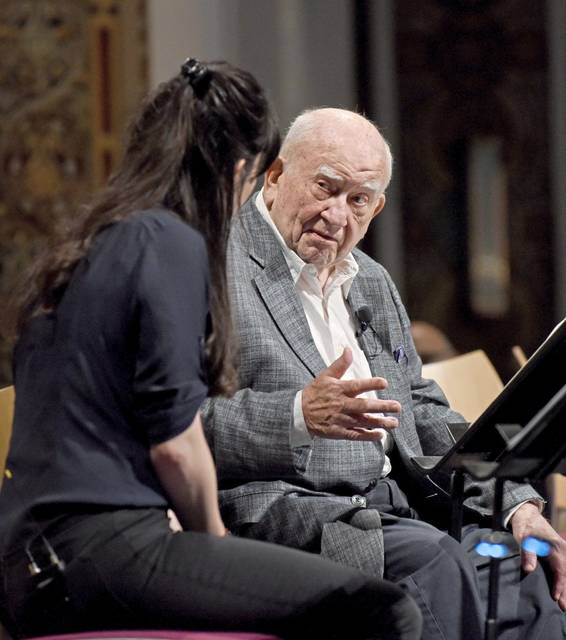Jeff Cohen distinctly remembers the day about 17 years ago when an elderly gentlemen approached him at his small theater in downtown Manhattan. The man handed him a manila envelope and said “maybe there is something you can do with this.”
The man’s name was Morris Spitzer and it was the first and only time Cohen met him. In the envelope was a Moments magazine article called “Slippery History” about Mr. Spitzer’s crusade to see soap included in Holocaust Memorial Museums throughout the country. Did the Nazis make soap from the fat of murdered Jews? That becomes the central question in Cohen’s play “The Soap Myth.”
The play, which is being presented by the Holocaust Center of Pittsburgh, stars seven-time Emmy Award winning actor Ed Asner (“The Mary Tyler Moore Show,” “Lou Grant”). It will be presented 7 p.m. May 6 at Rodef Shalom Sanctuary in Shadyside. A free student matinee will be held on May 7 for area schools. It’s the culmination to the Holocaust Center’s annual Yom HaShoah Week of Remembrance, a series of special events commemorating victims of the Holocaust.
Asner will turn 90 on Nov. 15. At an age when most people have long since retired, he says acting keeps him going. “It’s a life serum,” says Asner by phone from New York. “Why quit on the thing that’s carried me all these years? It’s a tremendous gift to be able to play this role.”
While “The Soap Myth” is a work of fiction, it does have a factual foundation. It is inspired by historical evidence that the Nazi regime had a program at the Danzig Anatomic Institute in 1944 to develop a process for the mass-production of soap from the fat of Jews being murdered in Nazi extermination camps.
“This thing about soap fascinated me,” says Cohen. “But it took a long time for me to figure out how to turn it into a play.”
Directed by Pam Berlin, the staged reading of Cohen’s play explores the friendship that develops between a young Jewish journalist and a ferocious, cantankerous Holocaust survivor named Milton Saltzman, played by Asner. Saltzman insists that the Nazis produced and used soap made from human corpses. The journalist named Annie Blumberg, played by Liba Vaynberg, finds herself caught between her sympathies for Saltzman and the insistence of distinguished Holocaust scholars who refuse to report the Nazi manufacture of soap as fact despite the eyewitness testimony of survivors. The scholars in the play fear that without proof, the story will be exploited by Holocaust deniers.
“The people who witnessed and survived the Holocaust are people who have to be honored, respected, and believed, because as my journalist character in the play says, they are the living history, they are the embodiment of the history of what happened. Whether or not they misremembered something, all of that is irrelevant,” says Cohen.
Cohen says he knew that Asner would be the perfect fit for the role of Saltzman.
“It is a dream come true,” says Cohen. “Of course when I wrote the play, that voice was swimming around in my head. But I dared not dream. Then I decided I was going to go for it and he says yes. And I have to say that at (nearly) 90 years old, he hasn’t lost a step. Working with him every day, spending every day with him has been such a glorious experience for me.”
“The role is self explanatory and it flows,” says Asner. “Jeff has crafted it very well. It’s a very emotional, beautifully written play. Any audience would be numbed by its presentation.”
Asner says he wants audiences to take away an appreciation for the dedication embodied by his character.
“That to me is the most important thing of all,” says Asner. “No matter the odds, plunge ahead. Put your nose up against their fists and bite them off. This is about persistence, the challenge of authority. The most important thing in our lives is to question authority and not to take no for an answer.”
The timing of this Pittsburgh performance has special meaning for Cohen, coming, as it does, six months after the Tree of Life Synagogue shooting that left 11 people dead. Cohen’s wife’s cousin, Daniel Stein, was one of those who died in the massacre.
“It’s very, very meaningful on a personal level,” says Cohen. “The tragedy in Pittsburgh, the rise of anti-Semitism and the rise of hatred of individual groups and religions, I wish my play didn’t speak to current issues like that.








